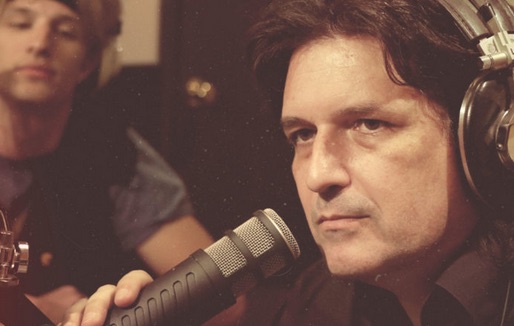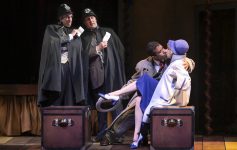Marco DiGeorge in TALK RADIO
By JOAN TADDIE
Theatre On The Edge could not have found a more controversial, provocative, timely play to produce as this country currently struggles with hopelessness and false gods, and is enflamed by information overload easily obtained by present day technology.
“Talk Radio” takes us back to the Reagan days of 1987, before cell phones, Facebook, and Twitter. Talking on the telephone was a common means of communication then, and the setting for this Pulitzer Prize nominated one-act drama by Eric Bogosian is Studio B of radio station WTLK in Cleveland, Ohio, a city where the manufacturing industry is in significant decline. Barry Champlain (Marco DiGeorge), a popular shock-jock, has just been notified by station manager, Dan Woodruff (Christian Wienker) that the corporate bosses will be listening to his live show, scheduled to air within the hour, to determine if he will get a national syndication. This sets the abusive late night call-in host on a belligerent tirade mocking those callers who despise or adore him; reminding them that, “Everything’s screwed up and you like it that way.”
Bogosian performed the lead role in “Talk Radio” when it premiered off-Broadway at The Public Theatre in 1987. He was seen again in the starring role of the film adaptation in 1988, directed by Oliver Stone. The play made its Broadway premiere in 2007 starring Liev Schreiber and was nominated for multiple awards. Schreiber was the recipient of the Drama League Award for Distinguished Performance.
Set designer, Samantha DiGeorge, creates through the art of Hyperrealism “two separate spaces that look entirely different yet blend together to create one
environment – and in the end become a working radio station.” Yes, everything works – audio boards, microphones, computers – and the actors operate everything in real time. For first time director, TOTE ensemble member Allan Whitehead, this means his actors must master the technical aspects of their scenes, as well as the timing of all the technical cues along with their theatrical blocking. They make it look easy!
Bogosian’s early career was as an award winning monologist, so it’s no surprise that his later plays and films should include powerful monologues. He was always interested in characters that represented the large population at the bottom of society’s strata, the lost souls. And there are many lost souls in this play, including the unseen callers played convincingly by Robb Maus, Mark Anthony Kelly, Cara Noel, Kelsey Hernandez, Joey Ginel, and Merritt Anne Greene.
Adam Minossora plays an assortment of callers, including Kent, who is the only caller the audience gets to meet. And what an entrance! Kent grabs the audience’s attention during his multiple phone conversations with Barry throughout the show. Kent idolizes Barry, but uses and learns from him to do the unthinkable, physically get on the show. Minossora’s focus and control of every muscle in his body is entertaining, believable, and riveting.
Spike (Christopher Ivers) is in most of the scenes, but has very few lines. He is almost invisible, though always in view. Spike represents the many technical people who are rarely seen, but are irreplaceable. Spike is not emotionally involved in the drama, but knows everything about the tech, no matter who is behind the microphone.
Three characters, Stu Noonan (Alex Jackson), Dan Woodruff, and Linda MacArthur (Elaitheia Quinn) are given monologues in this play that provide the audience with some personal background that they have with Barry. To perform these monologues, Whitehead empties the stage, dims the lights, and allows the actors to break the 4th wall and speak directly to the audience.
Stu discusses how much he idolizes Barry and his long association with him as his board operator. Stu has given up his own on-air career to follow his idol. Later on in the play, there is a blow-up between the two over the callers Stu is putting through to Barry. Jackson effectively uses his monologue to set up this conflict.
Christian Wienker gives a strong performance as his character, Dan Woodruff, explains to the audience that his relationship with Barry is nothing but business. He describes how he found Barry on an Akron station and created the persona that Barry is to his audience right now. He will use Barry until he burns up and then find someone else to replace him. Nothing personal!
Elaitheia Quinn as Linda MacArthur describes in her monologue that although she and Barry are intimate, she wants to get closer. She wants to “fix” him, but he doesn’t recognize that there is anything wrong that needs fixing. Quinn is a strong, physical actress who can communicate without speaking a word.
Marco DiGeorge as Barry Champlain is a perfect fit. DiGeorge embraces this larger than life character with smart performance choices that keep Barry more human than a fabricated false god. DiGeorge gives a masterful performance of his final monologue. The heart-rending pause at the end is breathtaking.
Barry Champlain leaves his audience with this message: “The only thing you believe in is me…I tell you what you are. I have no choice…I guess we need each other.”
SIDE O’ GRITS: “Talk Radio” runs through Dec. 8 at Theater on the Edge, 5542 Hansel Ave., Orlando, FL. Tickets start at $22. Visit TheaterOnTheEdge.org.











